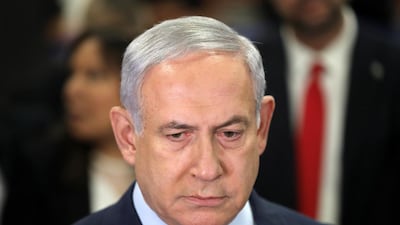Israel's parliament voted to dissolve itself early on Thursday after Prime Minister Benjamin Netanyahu failed to meet the deadline to form a governing coalition, sending the country into the chaos of an unprecedented snap second election.
It also cast doubt over the longtime leader's future. Infighting among his allies and opposition to proposed bills to protect him from prosecution – he faces potential indictments for bribery – fraud and breach of trust, stymied his efforts to put together a majority coalition.
Mr Netanyahu denies any wrongdoing, labelling the accusations as a “witch hunt”.
Israel has never before held two elections in one year. Mr Netanyahu risks losing the national vote in September, but it at least gives him time to regroup and try again. But who is he likely to face?
The Arab vote
Arabs have been consistently driven away from the political discourse for years, with their elected representatives demonised and their language marginalised, which has led to them rejecting Mr Netanyahu and his ideology. But while 21 per cent of the electorate is Arab-Israeli, fewer than half of them voted at the last election, held on April 9.
Arab voting numbers have been sliding downward for years due to disillusionment with the electoral process and growing alienation from Israeli society creating apathy.
Balad-Ra’am, a coalition of two Arab parties headed by Abas Mansour that opposes Israel’s occupation of Palestinian territory, barely passed the 3.25 per cent threshold. Combined with a second Arab party coalition of Hadash and Ta’al, it combined to gain 10 seats, which is down 13 from the previous Knesset.
In 2015, however, the four main Arab parties united to form the Joint List. It remains unclear yet whether the parties will unite again.
Benny Gantz
Mr Gantz, a political newcomer who headed Israel’s military operation during the 2014 Gaza war, emerged as a serious rival to Mr Netanyahu and his Likud Party in the April election. His newly formed centrist Blue and White party won 35 seats at the April election, the same as Mr Netanyahu.
Although Mr Gantz has called for peace with the Palestinians and signalled he would make territorial concessions, at the start of his last election campaign he released a video glorifying the numbers of Gazans killed during fighting. The move may have found Mr Gantz some favour among Israelis who viewed him as too far to the left and soft on security, but it deeply angered and alienated Palestinians.
There was speculation the president might ask Mr Gantz to try to form the next government, but he has few potential allies to form a majority.
Avigdor Lieberman
The secular, ultra-nationalist Yisrael Beitenu party is led by former defence minister and Soviet Union immigrant Avigdor Lieberman, who lives in an illegal settlement in the West Bank. His party’s base includes largely secular Russian-speaking Israelis and it holds five seats in the Knesset.
Six months ago, he resigned as defence minister, which set in motion the events that have led to the current crisis. He resigned over Israel’s adherence to an Egyptian-brokered ceasefire in Gaza, saying it was the equivalent of the government "capitulating to terror". But many suspect his actions were rooted in personal ambition.
Avi Gabbay
Labour party leader Avi Gabbay said that Mr Netanyahu offered the party the chance to join a coalition, which he rejected. The party had a disastrous election last time, dropping from 18 seats to six. Mr Gabbay has publicly backed a two-state solution with the Palestinians and the party's campaign stressed pursuing peace.
Yakov Litzman
Heading United Torah Judaism, which represents ultra-Orthodox Jews and has eight seats, traditionally puts its religious demands above larger issues like security and the Israeli-Palestinian conflict.

